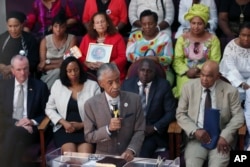For Baton Rouge, Louisiana Police Department Lt. Robert McGarner, a simple prayer and embrace make a difference in dealing with tragedy.
"Our community is healing and we need to support each other," McGarner said as a group of fellow officers surrounded a makeshift memorial to fellow fallen officers.
McGarner's department, the community and nation are mourning the loss of three Baton Rouge police officers who were ambushed and assassinated last Sunday by a gunman who authorities say expressed hatred for police.
Heartbreak and resolve
The July 17 attack came on the heels of another targeted shooting in Dallas, Texas, where five police officers were killed on July 7 by a lone gunman with a military-style assault rifle. Both shooting suspects were black and their crimes were committed against a backdrop of nationwide protests over police brutality against African-Americans.
McGarner, who is black, said despite the violence and protests, officers understand they still have a job to do.
"After I make my peace with God, I leave out my door and I am willing to give my life for any one of you out here. I don't know your name and I don't have to know your name," he said to a crowd of people surrounding him.
Tense time for cops and black community
Law enforcement analysts say many police departments feel embattled, leading to a heightened sense of vigilance among officers.
"Please understand our position. We don't know you, and we don't know that you are not a threat. We don't know anybody in the scenario most often," said Los Angeles County Sheriff Jim McDonald.
Many of the nation's 18,000 law enforcement agencies acknowledge the complexities of the job, often responding to dangerous situations involving suspects who are agitated, under the influence of drugs or alcohol, or struggling with mental illness.
Relations between police and African-American communities remain tense, especially after viral videos earlier this month that showed the graphic shooting death of an African-American man by police officers in Baton Rouge, Louisiana, and later, the aftermath of a deadly shooting in Falcon Heights, Minnesota.
Demonstrations in Baton Rouge led police officer Montrell Jackson, who was gunned down in the July 17 killing, to post on Facebook days earlier, "I love this city, but I wonder if this city loves me."
Black activists maintain that unjustified shootings of Africans-Americans by police have to stop along with the retaliatory killing of police officers.
"The black community is not anti-police; the black community is anti-police misconduct," Al Sharpton, a civil rights leader, said. He and other leaders are working with President Barack Obama on reducing violence and improving relations between police and African American communities.
Residents in some communities are going out of their way to show support for police officers. African American Quincy Brown approaches white Raleigh, North Carolina Police Captain Craig Haines with words of solidarity. "That guy in Dallas (the shooter) and all these other criminals that do what they do, we don't think like that. Every black person in this world doesn't think like that. I respect you and appreciate that you leave your family to come take care of my family, to protect me." Brown told Haines.
Law enforcement leaders say policing is a business where the use of force is unfortunately a part of their job; but, they stress police misconduct cannot be tolerated nor can attacks on officers doing their jobs. "We need to work on this as a nation as Americans, not as individual groups, not as police versus civilians, not as black versus white," said Charlie Beck, chief of the Los Angeles Police Department.
Changing tactics to keep officers and residents safe
Police departments across the country have updated tactics and adjusted procedures they hope will guard against similar targeted plots against officers. "It's very important for us to do everything we can to help police officers go home at night and to be safe," President Obama said recently during a meeting with senior advisers on ways to better protect law enforcement personnel.
At the same time, law enforcement agencies are increasing security and surveillance around anti-police protests and demonstrations. Some departments issued new guidelines for cops to patrol in pairs, send out more tactical officers on the streets and purchase equipment like bulletproof vests.
Law enforcement analysts say they believe the targeted police shootings could have a backlash where some cops on the streets retreat from engaging in high crime areas. They say it could also put at risk community-based policing programs where officers have meaningful engagement with the communities they are sworn to protect and serve. Some police chiefs like Terry Cunningham from Wellesley, Massachusetts don't think that will happen. "This isn't about statistics on one side or the other anymore. This is about emotion. It is about peoples' lives. This is about fear in the community and it's our job as police officers to make sure people feel safe."






